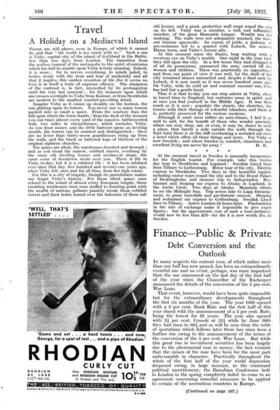Travel
A Holiday on a Mediaeval Island
THERE are still places, even in Europe, of which it cannot be said that " the world is too much with us." Such a one is Visby, capital city of the island of Gothland in the Baltic, less than two days from London. The transition from the restless turmoil of the metropolis to the quiet of centuries which has laid its mantle upon Visby is truly amazing. Indeed, it is more ; for to nerves overstrung, to minds jaded, to bodies weary with the wear and tear of modernity and all that it implies, this sudden cessation of life (for it seems no less) is in itself a tonic of supreme efficacy. The sharpness of the contrast is, in fact, intensified by its prolongation until the very last moment ; for the steamers upon which one crosses overnight to Visby from Kalmar, or from Stockholm are modern to the smallest comfort-providing detail.
Imagine Visby as it comes up steadily on the horizon, the sun glinting upon its towers. You never saw so many towers packed into so small a space. From the seashore rises the hill upon which the town stands ; from the deck of the steamer you can trace almost every yard of the massive, battlemented wall, two miles in circumference, which encircles Visby. As you draw nearer, and the little harbour opens an inviting mouth, the towers can be counted and distinguished ; there are no fewer than thirty-seven guardhouses rising up from the walls, and the black or battered tops of thirteen of the original eighteen churches. The quays are silent, the warehouses deserted and decrepit ; and as you tread the narrow, cobbled streets, overhung by the crazy old dwelling houses and mediaeval shops, the same sense of desolation steals over you. There is life in Visby to-day, but it is a subdued life ; it has been subdued ever since that day, five hundred and seventy-one years ago, when Visby fell, once and for all time, from her high estate.
For this is a city of tragedy, though its peacefulness makes one forget Visby's history. For those silent quays once echoed to the sound of almost every European tongue, those tumbling warehouses were once stuffed to bursting point with the wealth of nations, gallants jauntily strode those cobbled streets and their ladies leaned over the balconies of those tall old houses, and a great, protective wall crept round the city on its hill. Visby was a member, a rich and influential member, of the great Hanseatic. League. Wealth was her undoing. The walls were not adequately manned, the look- out became spasmodic. An excess of pride, a jealousy of pre-eminence led to a quarrel with Lubeck, the nearest Hansa town, and Visby's former ally. At this moment came the Danes, long waiting with a covetous eye on Visby's wealth. One night in the year 1361 they fell upon the city. In a few hours they had stripped it of all its possessions, massacred the men, carried off the women and children. There was practically no opposition ; and from our point of view it was well, for the shell of the city remained almost untouched and, despite a final sack by Lubeck, it is now much as it was seven hundred years ago. On Visby, with its mild air and constant summer sun, time has laid but a gentle hand.
Thus it is that to-day you can step ashore at Visby, close in travel time to England, but centuries away in spirit, and at once you find yourself in the Middle Ages. It was then much as it is now • populate the streets, the churches, the towers with their throngs of colourful islanders, and there it is, perfectly preserved for the curious moderns.
Although it must seem rather an anti-climax, I feel it as well to add, for the benefit of those who wonder precisely where one may sleep, eat, or even, it may be, dance in such a place, that barely a mile outside the walls through the East Gate there is on the cliff overlooking a secluded sea cove a hotel which offers all these things and more. For Visby is now Swedish ; and where Sweden is, comfort, cleanliness and
excellent living are never far away 1 R. K.
At the moment travel in Sweden is unusually inexpensive for the English tourist. For example, take this twelve day tour to Stockholm and Lapland : Swedish Lloyd liner from Tilbury to Gothenburg. Motor tour of the city. Electric express to Stockholm. Two days in this beautiful capital, including motor tours round the city and to the Royal Palace of Drottingholm, and steamer trip to Saltsjobaden. Res- taurant and sleeping car express to Abisko in Lapland, in the Arctic Circle. Two days at Abisko. Mountain climbs to see the Midnight Sun. Trip across lake to Lapp Encamp- ment, to great waterfalls and pre-historic canyon. Sleeping and restaurant car express to Gothenburg. Swedish Lloyd liner to Tilbury. Arrive London 34 hours later. Fluctuations in the rate of exchange make it impossible to give exact figures ; but the approximate cost of such a tour, inclusive, would now be less than £23—for the £ is now worth 21s. in Sweden.






























 Previous page
Previous page